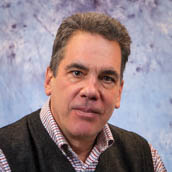
Professor Emeritus
leidhoas@jmu.edu
Contact Info
Ph.D. Old Dominion University
Ed.S. Indiana University
M.S. Clarion University
B.A. Virginia Wesleyan College
I came to JMU in 2001 after serving as an associate and an assistant professor at Purdue University, a visiting assistant professor at Indiana University (where I earlier completed a year of postdoctoral work), and an assistant professor/associate director at Old Dominion University.
My research centers on journalistic dissent and on attempts to silence that expression. Until recently, I have written exclusively about southern journalists, who in the first half of the twentieth century spoke out against the Ku Klux Klan, exploitative employers, lynching, Jim Crow, sexism, religious intolerance, and cruel conditions within prisons and mental institutions. I've written two biographies of Pulitzer prize-winning newspaper editors (Standing Before the Shouting Mob: Lenoir Chambers and Virginia's Massive Resistance to Public-School Integration, University of Alabama Press and Editor for Justice: The Life of Louis I. Jaffé, Louisiana State University Press). I’ve also published a biography of Nell Battle Lewis, the South's most important female journalist in the 1920s (Battling Nell: The Life of Southern Journalist Cornelia Battle Lewis, 1893-1956, Louisiana State University Press).
Several years ago, I expanded my research agenda to an area consistent with the larger themes of my earlier scholarship but one focusing on historical issues not explored in my publications. I have been investigating the United States Post Office Department’s surveillance and suppression of the press, especially foreign-language newspapers, during America’s involvement in World War I. In the summer of 2019 American Journalism published my article, “The Mysterious Mr. Maxwell and Room M-1: Clandestine Influences on American Postal Censorship during World War I.” The following year Journalism History published my manuscript entitled “Dancing with Two Cork Legs: The American Post Office’s Stumbling Surveillance of the Foreign-Language Press during World War I.” Currently I am at work on a third piece exploring the crackdown on the dissident press during World War I. It will examine the close scrutiny that the government’s surveillance infrastructure directed in New York City toward foreign-language publications for socialists, anarchists, and members of the radical Industrial Workers of the World labor union.
Prior to becoming a professor, I worked for a dozen years as a media writer and director for an advertising agency, corporations, and educational institutions. I won a number of awards for my work, including a Gold Medal from the Council for Advancement and Support of Education and a Crystal Award from the Association for Educational Communications and Technology for the U.S.A./U.S.S.R. Youth Summit Series, three television programs focusing on the lives of Soviet and American teenagers. PBS and the Soviet Union’s largest television network aired the series.
Teaching Interests: Media history
Research Interests: History of the foreign-language and the southern presses and of the United States Post Office Department
